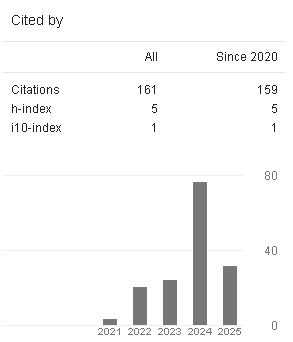Analisis Perbandingan Taubat Adam Menurut Perspektif Islam dan Yahudi
Comparative Analysis of Adam’s Repentance According to Islam and Judaism Perspectives
Keywords:
Prophet’s infallibility, Impeccable, Forbidden fruit, Semitic religion, Kemaksuman nabi, Ismah, Buah khuldi, Agama semitikAbstract
The Judaism and Islamic conceptions of repentance are nearly identical. The Quran and Torah mention the story of Adam and Eve eating the forbidden tree. Some Islamic scholars criticise the text of the Torah that exists today for the narrative style that portrays it as if Adam never repented of the act. Therefore, this research paper aims to identify Jewish scholars' position regarding Adam’s repentance. The first objective is to identify the recognition of Adam’s prophethood according to Islam and Judaism. The second objective is to identify the conviction of sin against Adam’s actions according to Islam and Judaism. According to Islam and Judaism, the third objective is to identify the certainty of Adam’s repentance. This research is a literary study, drawing information from the works of Islamic and Jewish scholars who have interpreted the story. A question was also asked to a contemporary Jewish scholar, Ben Abrahamson, who studies Islam. The results found that, first, Islam recognises Adam’s prophethood except for some contemporary scholars who deny it. However, for Judaism, it is not clearly stated that some Jewish scholars recognised Adam as a prophet. Second, Islam and Judaism admit that Adam sinned in that regard. Third, the Quran clearly says Adam repented, while the Torah does not. However, according to the oral tradition of Jewish scholars, Adam did repent through actions by immersing himself in the Gihon River for 130 years to atone for his sins.
Konsep taubat Yahudi hampir sama dengan Islam. Al-Quran dan Taurat ada menyebutkan kisah Adam dan Hawa memakan pohon terlarang. Beberapa sarjana Islam mengkritik teks Taurat yang wujud sekarang ini terhadap gaya penceritaannya yang menggambarkan seolah-olah Adam tidak pernah bertaubat daripada perbuatan tersebut. Oleh itu, tujuan kertas kajian ini adalah untuk mengenal pasti pendirian sarjana Yahudi berkenaan taubat Adam. Objektif pertama, mengenal pasti penetapan kenabian Adam menurut Islam dan Yahudi. Objektif kedua, mengenal pasti penentuan dosa terhadap perbuatan Adam menurut Islam dan Yahudi. Objektif ketiga, mengenal pasti pengiktirafan taubatnya Adam menurut Islam dan Yahudi. Kajian ini bersifat kajian kepustakaan, maklumat dikumpulkan daripada kitab-kitab sarjana Islam dan Yahudi yang mentafsirkan kisah tersebut. Soalan juga ada dikemukakan kepada tokoh sarjana Yahudi kontemporari yang mengkaji Islam, iaitu Ben Abrahamson. Hasil dapatan mendapati, pertama, agama Islam mengakui kenabian Adam kecuali sebahagian sarjana kontemporari yang menafikannya. Manakala bagi agama Yahudi tidak dinyatakan secara jelas, tetapi terdapat sarjana Yahudi yang menyabit kenabian Adam. Kedua, agama Islam dan Yahudi mengakui Adam berdosa dalam hal tersebut. Ketiga, al-Quran dengan jelas mengatakan Adam bertaubat, manakala Taurat tidak menyatakannya. Tetapi menurut riwayat sarjana Yahudi, Adam memang bertaubat melalui perbuatan dengan cara merendamkan diri di dalam Sungai Gihon selama 130 tahun untuk menebus dosanya.
Downloads
References
Abd Halim, I., Muhammad, A., Adnan, I., & Ismail, A. A. (2022). “Perbezaan Etimologi dalam Qiraat al-Quran dan Kesannya kepada Pentafsiran: Kajian Terhadap Perkataan Fa'azallahumā.” RABBANICA-Journal of Revealed Knowledge, 3(1), 73-88.
Abrahamson, R. B. (2010). Facebook Status. Diakses pada 31 Okt 2020. https://m.facebook.com/story.php?story_fbid=3701876083176058&id=100000611078032
Albo, Joseph. (1929). Sefer Ha-ikkarim (Book of Principles). United States of America: Jewish Publication Society of America.
Al-Bukhari, Muhammad bin Isma‘il. (2001). Sahih al-Bukhari. Tahkik oleh Muhammad Zuhair. 9 jil. Lubnan: Dar Tauq al-Najah.
Al-Hafi, ‘Amir ‘Adnan. (2015). “Al-Jannah fi al-Talmud al-Babiliy: Dirasah Muqaranah fi Dau’ al-Qur’an al-Karim.” Islamiyat Al-Ma’Rifah 20 (79):49-88.
Al-Haithamiy, Nur al-Din ‘Aliy. (1994). Majma’ al-Zawa‘id wa Manba’ al-Fawa‘id. Tahkik oleh Husam al-Din. 10 jil. Kaherah: Maktabah al-Qudsiy.
Al-Qariy, ‘Aliy bin Muhammad. (1998). Minah al-Raud al-Azhar fi Sharh al-Fiqh al-Akbar. Beirut: Dar al-Basha‘ir al-Islamiyyah.
Al-Qurtubiy, Muhammad bin Ahmad. (1964). Al-Jami’ li Ahkam al-Qur‘an. 20 jil. Kaherah, Mesir: Dar al-Kutub al-Misriyyah.
Al-Raghib al-Asfahaniy, al-Husain bin Muhammad. (1991). Al-Mufradat fi Gharib al-Qur‘an. Tahkik oleh Safwan. Beirut: Dar al-Qalam.
Al-Razi, Fakhr al-Din. (1999). Mafatih al-Ghaib. 32 jil. Beirut: Dar Ihya’ al-Turath al-‘Arabiy.
Al-Saqa, Ahmad Hijaziy. T.thn. Naqd al-Taurah: Asfar Musa al-Khamsah. Mesir: Maktabah al-Nafidhah.
Al-Tabariy, Muhammad bin Jarir. (2001). Tafsir al-Tabariy Jami’ al-Bayan ‘an Ta’wil Ay al-Qur’an. Mesir: Dar Hajar.
Al-Zamakhshari, Mahmud bin ‘Amr. (1986). Al-Kashshaf ‘an Haqa‘iq Ghawamid al-Tanzil. 4 jil. Beirut, Lubnan: Dar al-Kitab al-‘Arabiy.
Avery-Peck, A., & Neusner, J. (2004). The Routledge Dictionary of Judaism. New York: Routledge.
Baliq, ‘Izz al-Din. (1990). Nubuwwah Adam wa Risalatuhu bayna al-Zann wa al-Yaqin. Beirut: Dar al-Fath.
Chabin, Michele. (2017). “Nonprofit Offers Talmud in English Online for Free.” The Christian Century, Tarikh akhir kemaskini March 28, diakses pada 25 April 2024. https://www.christiancentury.org/article/nonprofit-offers-talmud-english-online-free.
Clines, David J.A. (ed.). (1998). The Dictionary of Classical Hebrew. 8 jil. Sheffield, England: Sheffield Academic Press.
Dollah, S. R. H., & Khambali, K. M. (2016). Konsep Taubat Menurut Islam dan Kristian dari Perspektif Perbandingan. Afkar: Jurnal Akidah & Pemikiran Islam, 18(1), 43-90.
Gafney, Wilda C. M. (2006). “She declared to them, ‘So says Yhwh, the God of Israel’: An examination of female prophets in ancient Israel.” Ph.D., Duke University.
Ghasan ‘Atif Badran. (2017). “Qissah Adam bayna al-Qur’an al-Karim wa al-Taurah: Dirasah Muqaranah.” Majallah Jami‘ah al-Quds al-Maftuhah li al-Buhuth al-Insaniyyah wa al-Ijtima‘iyyah (22):291-324.
Hamdan, N. Q., Sahad, M. N., & Abdullah, S. (2021). Hamka’s Concept of Prophets’ Infallibility: An Analysis on Tafsir al-Azhar. BITARA International Journal of Civilizational Studies and Human Sciences, 4(3), 1-9.
Hamdan, Nazmi Qayyum. (2021). Konsep Kemaksuman Nabi Menurut Judaisme: Penilaian Semula Kritikan Sarjana Islam. Tesis sarjana, Universiti Sains Malaysia.
Hayah bin Muhammad bin Jibril. (2002). Al-Athar al-Waridah ‘an ‘Umar bin ‘Abd al-‘Aziz fi al-‘Aqidah. Madinah: ‘Imadah al-Bahth al-‘Ilmiy bi al-Jami‘ah al-Islamiyyah.
Ibn Battah al-‘Ukbariy, ‘Ubaidullah. (1997). Al-Ibanah ‘an Shari‘ah al-Firqah al-Najiyah wa Majanabah al-Firaq al-Madhmumah. Riyad: Dar al-Rayah.
Ibn Khumair, ‘Aliy bin Ahmad al-Sibtiy al-Umawiy. (1990). Tanzih al-‘Anbiya’ amma nasaba ilaihim huthalah al-aghbiya’. Tahkik oleh Muhammad Ridwan. Beirut, Lubnan: Dar al-Fikr.
Ibn Taimiyyah, Ahmad bin ‘Abd al-Halim. (1995). Majmu’ al-Fatawa. 35 jil. Arab Saudi: Majma’ al-Malik Fahd li Taba‘ah al-Mushaf al-Sharif.
Ibn Taimiyyah, Ahmad bin ‘Abd al-Halim. (1999). Al-Jawab al-Sahih li man Baddala Din al-Masih. Tahkik oleh Hamdan et al. 6 jil. Arab Saudi: Dar al-‘Asimah.
Jeffery, Arthur. (2007). The Foreign Vocabulary of the Qur‘an. Dalam Gerhard Böwering & Jane Dammen McAuliffe (Ed.), Texts and Studies on the Qur‘an, Netherlands: Brill.
Kaiser, Karen. (2009). “Protecting respondent confidentiality in qualitative research.” Qualitative health research 19 (11):1632-1641.
Katsh, Abraham L. (1980). Judaism in Islam. New York: Sepher-Hermon Press.
Klein, Ernest. (1987). A Comprehensive Etymological Dictionary of The Hebrew Language For Readers of English. Tel Aviv: Carta Jerusalem.
Kurzweil, Arthur. (2008). The Torah for Dummies. Indianapolis, Indiana: Wiley Publishing Inc.
Kvale, Steinar. (1996). Interviews: An Introduction to Qualitative Research Interviewing. Amerika Syarikat: Sage Publications Inc.
Legarreta-Castillo, Felipe. (2011). “The Figure of Adam in Rom 5:12-21 and 1 Cor 15:21-22, 45-49: The New Creation and its Ethical and Social Reconfigurations.” PhD, Graduate School, Loyola University Chicago (3469990).
Mujahideen, H. A., & Hamidi, A. G. (2020). Konsep taubat menurut perspektif Islam. Journal of Islamic, Social, Economics and Development, 5(29), 100-108.
Pope, Marvin H. (2007). Adam. Dalam F. Skolnik (Ed.), ENCYCLOPAEDIA JUDAICA (hlm. 371). Jerusalem: Keter Publishing House Ltd.
Skolnik, Fred (ed.). (2007). ENCYCLOPAEDIA JUDAICA. Ed ke-2. 22 jil. Jerusalem: Keter Publishing House Ltd.
Solah al-Khalidi. (1998). Al-Qasas al-Qur’aniy: ‘Ard Waqa’iq wa Tahlil Ahdath. Jeddah: Dar al-Bashir.
Tottoli, Roberto. (2002). Biblical Prophets in the Qur’an and Muslim Literature. New York: Routledge.
Downloads
Published
How to Cite
Issue
Section
License
Copyright (c) 2024 RABBANICA - Journal of Revealed Knowledge

This work is licensed under a Creative Commons Attribution-NonCommercial 4.0 International License.












